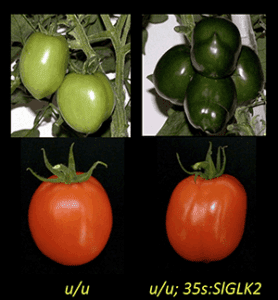News
Researchers Discover Link between Tomato Ripening, Color, and Taste
 According to an old country song, the only two things money can’t buy are true love and homegrown tomatoes. How true – those perfect, red tomatoes from the store just can’t match ones plucked from the garden. Now, researchers have identified the gene that controls the ripening, according to a study published in the June 29 of Science.
According to an old country song, the only two things money can’t buy are true love and homegrown tomatoes. How true – those perfect, red tomatoes from the store just can’t match ones plucked from the garden. Now, researchers have identified the gene that controls the ripening, according to a study published in the June 29 of Science.
Co-author Cuong Nguyen, a Cornell graduate student in the field of plant breeding, with colleagues at the Boyce Thompson Institute for Plant Research (BTI – where Nguyen works) on the Cornell campus, University of California-Davis, among others, translated the gene that controls the level of sugars, carbohydrates and carotenoids in tomatoes. This gene also influences how tomato fruit ripen, the reason commercial tomatoes develop into perfectly red, store-ready fruit.
“Practically, it is a very important trait,” says James Giovannoni, a plant molecular biologist with BTI and the U.S. Department of Agriculture (USDA), Agricultural Research Service and one of the senior authors of the paper. “It’s a mutation that most tomatoes have.”
However, this same trait reduces sugars and nutrients in the fruit.
Naturally, tomatoes unevenly ripen, showing darker green patches when unripe and variable redness when ripe – traits that still show up in garden-variety and heirloom breeds. However, in the late 1920s, commercial breeders stumbled across a natural mutation that caused tomatoes to ripen uniformly – from an even shade of light green to an even shade of red. This “uniform ripening” mutation has become indispensable to the $2 billion a year U.S. commercial tomato market, showing up in almost all tomatoes produced for grocery stores. The uniform redness makes it ideal for groceries, where customers expect evenly colored, red fruit.
Nguyen conducted positional cloning and, with access to solgenomics.net, an online, public database hosted at BTI, determined that the uniform ripening gene was located at a specific location on chromosome 10. With this location now known, the team could decipher the gene coding for the protein that controls photosynthesis levels in tomatoes and the genetic lesion resulting in the mutation.
While leaves are the primary photosynthesis factories in a plant, developing tomato fruit can contribute up to 20 percent of their own photosynthesis, yielding high sugar and nutrient levels in fully ripe fruit. The uniform ripening mutation, which commercial breeders select for, eliminates this protein in the fruit, therefore reducing sugar levels.
“This is an unintended consequence,” says Giovannoni, explaining why commercial growers continue to select for the trait. “Producers currently don’t get a penny more for [flavor] quality.”
This discovery has practical applications. Commercial producers (who still have incentives to produce uniform, red, fruit over multicolored, flavorful ones) can now test early on seedling DNA for the uniform ripening mutation, rather than waiting to observe mature fruit. Conversely, those who care less about appearances can ensure that their plants are uniform ripening mutation-free, and thus, may have better-tasting fruit.
Ann Powell, a research biochemist who led the UC-Davis team on the research, says that the study “is a rare chance to translate scientific findings to the real world…it provides a strategy to re-capture quality characteristics that had been unknowingly bred out of modern cultivated tomatoes.”
The study also included researchers at USDA, Universidad Politecénica de Valencia (Spain), Universidad de Málaga (Spain) and University of Suleyman Demiral (Turkey).
The USDA and the National Science Foundation support work in the Giovannoni lab at BTI.
Laura Cahoon is a freelance writer in Ithaca, N.Y

